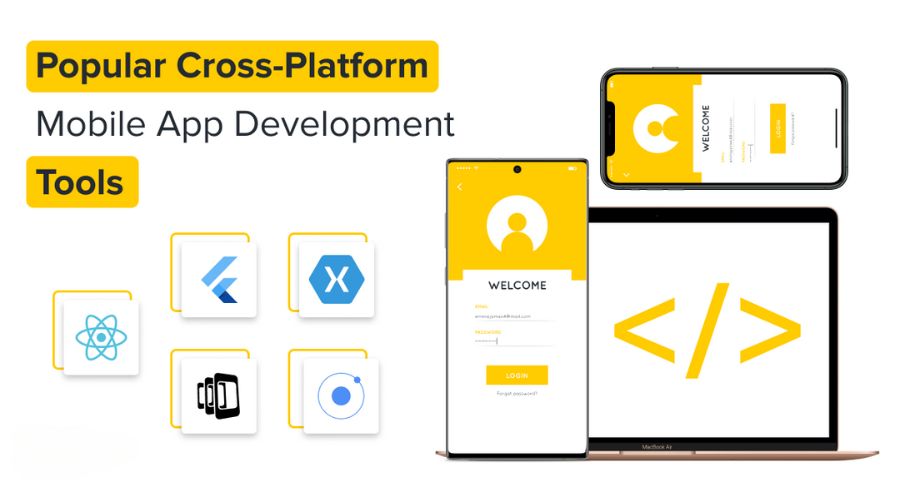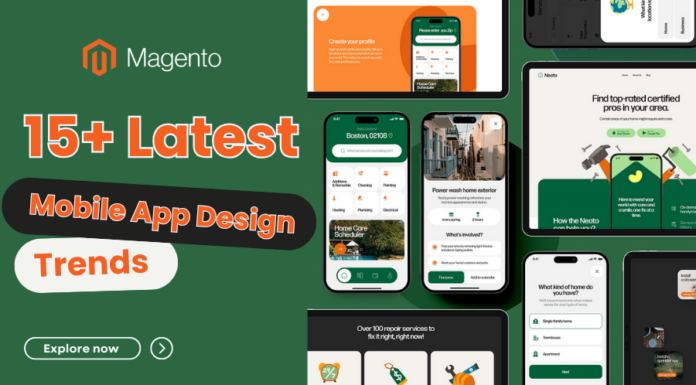
Summary: Many different mobile app development frameworks are available, each with strengths and weaknesses. Knowing what frameworks are used for app development for your project can be daunting.
Table of Contents
What is cross-platform mobile app development?
Over the years, cross-platform app development has become one of the most popular ways to build mobile apps. This platform approach allows developers to create apps that run similarly on different mobile platforms.

Using a single code base, mobile engineers use cross-platform mobile development frameworks to create native-looking apps for multiple platforms. Shareable code is one of the main advantages of this approach over native app development, saving mobile engineers time.
The choice of framework largely depends on your project and goals, as well as other details we cover at the end of the article. So, read the following article to learn the common frameworks used in cross-platform app development.
How to choose the best mobile app development framework?
It’s essential to remember a list of tools is insufficient nowadays because many other options are available today. So, when choosing a cross-platform app development framework, there are several factors you should consider. These include:
- Your project’s requirements: What features does your app need? What platforms will it be deployed on? How much time and money do you have to develop the app?
- The framework’s capabilities: Each framework has its strengths and weaknesses. Some frameworks are better suited for certain types of apps than others. Take some time to research each framework and compare its features.
- The framework’s community: A large and active community of developers can be a valuable resource when you’re developing an app. Make sure to choose a framework that has a large and active community.
- The framework’s support: Make sure your chosen framework has good support. It includes documentation, tutorials, and bug fixes.
Which framework can be used to develop cross-platform applications?
There are many different popular cross platform mobile app development tools available. Some tools include which framework can be used to develop cross-platform applications.

- Xamarin: Xamarin is a popular choice for developing native-looking apps for iOS and Android. It uses C# as its programming language, making it easy for developers already familiar with it.
- Xamarin Logo Ionic: Ionic is a framework that uses HTML, CSS, and JavaScript to create cross-platform apps. It’s a good choice for developers using web technologies to develop their apps.
- Ionic Logo React Native: React Native is a framework that uses React, a popular JavaScript library, to create native-looking apps for iOS and Android. It’s a good choice for developers who want to use React to develop their apps.
- React Native Logo Flutter: Flutter is a framework that uses Dart, a new programming language developed by Google, to create cross-platform apps. It’s a good choice for developers who want to develop their apps with a new and innovative framework.
In addition to the factors mentioned above, you should also need to consider the following when choosing a cross-platform mobile application development framework:
- The framework’s licensing terms: Some frameworks are free to use, while others require a paid license. Make sure to choose a framework that fits your budget.
- The framework’s performance: Some frameworks are more performant than others. If you’re developing a high-performance app, you’ll need to choose a framework to deliver the performance you need.
- The framework’s security: Security is important for any mobile app. Make sure to choose a framework designed with security in mind.
Considering all these factors, you can choose the right Cross platform framework for your project.
Cross-platform app development tools: Pros and Cons
Cross-platform application development tools offer several advantages and disadvantages. Let’s explore them:
What are the advantages of cross-platform apps?
- Code Reusability
Cross-platform tools allow developers to write code once and deploy it across multiple platforms, such as iOS and Android. It significantly reduces development time and effort compared to building separate native apps for each platform.
- Cost-Effectiveness:
By leveraging cross-platform development tools, companies can save costs by maintaining a single codebase for multiple platforms that separate development teams and reduce overall development expenses.
- Faster Time to Market:
With cross-platform tools, developers can build apps more quickly. They can reuse components, libraries, and frameworks, resulting in faster development cycles and quicker deployment to the app stores.
- Consistent User Experience:
Cross-platform development tools often provide UI frameworks that offer a consistent look and feel across different platforms. It helps maintain a unified user experience and branding, ensuring users have a similar experience regardless of their device.
- Simplified Maintenance:
Since cross-platform apps share a common codebase, updates and bug fixes can be applied more efficiently. Developers can make changes in one place, and the updates will be reflected on all platforms simultaneously, reducing maintenance efforts.
What are the disadvantages of cross-platform apps?
- Performance Limitations:
Cross-platform tools rely on frameworks and interpreters, which can introduce performance overhead compared to native development. This can impact app speed, especially for resource-intensive tasks like complex animations or high-performance gaming.
- Limited Access to Platform-Specific Features:
Cross-platform apps may not provide immediate access to all the latest platform-specific features and functionalities. Developers may need to wait for updates or find workarounds to incorporate certain features, which can delay implementation.
- Potential UI/UX Limitations:
While cross-platform tools aim to provide consistent UI/UX, there may be limitations in replicating the native look and feel perfect. The app’s UI may not entirely match the platform-specific design guidelines, leading to a slightly different user experience.
- Dependency on Third-Party Tools:
It often relies on third-party frameworks or libraries and introduces a dependency on external tools. If these tools become deprecated or unsupported, it can create challenges for maintaining and updating the app.
- Learning Curve and Skill Set:
It requires specific cross-platform app development languages to become proficient in these tools, which may take time and effort. Additionally, developers with deep knowledge of native development may need to adjust their mindset and approach when working with cross-platform tools.
Conclusion
When it comes to any mobile app, choosing the right cross-platform development framework can be a crucial decision. With so many options available in the market, it can be overwhelming to make the right choice. However, you can streamline your decision-making process by considering factors such as programming language, development team expertise, user interface requirements, and target platforms.












![[SALE OFF] Discount 30% All Premium Extensions On Christmas And New Year 2025 christmas-and-new-year-2025](https://landofcoder.b-cdn.net/wp-content/uploads/2024/12/christmas-and-new-year-2025-1-218x150.png)






